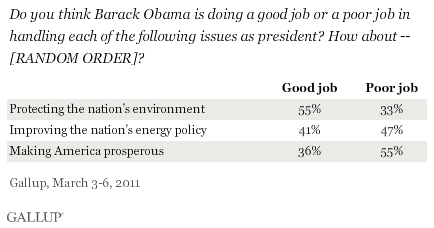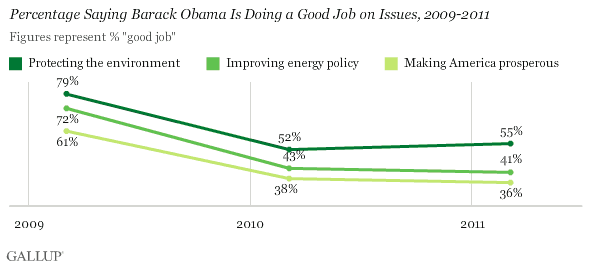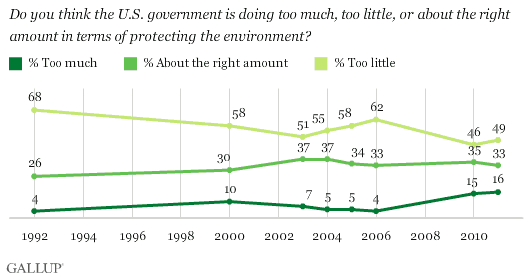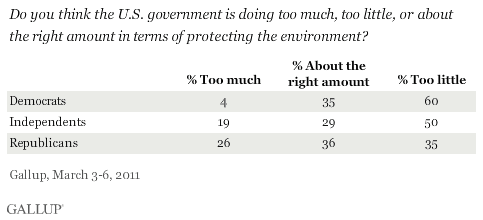PRINCETON, NJ -- Before the Japanese earthquake and resulting nuclear crisis, a majority of Americans -- 55% -- said President Obama is doing a good job of protecting the nation's environment. At the same time, 55% said he is doing a poor job of making America prosperous and, by 47% to 41%, Americans said he is doing a poor rather than a good job of improving the nation's energy policy.

These results are based on Gallup's annual Environment survey, conducted March 3-6, just prior to the March 11 earthquake, tsunami, and resulting nuclear crisis in Japan. The survey asks Americans to rate the president on these three dimensions. Obama's ratings on all three are similar to his ratings last year, but remain well below those from March 2009, shortly after he took office.

These trends generally mirror trend, which declined over the course of his first year but has been more or less stable since then.
Compared with George W. Bush's ratings on the same dimensions in his last year in office, Obama is better on all three dimensions, with significantly higher ratings on the environment (55% good job versus 31% for Bush in 2008) and energy policy (41% vs. 23%), and slightly higher ratings on the economic dimension (36% vs. 27%).
Nearly Half of Americans Say Government Not Doing Enough for the Environment
Although Obama gets positive marks for protecting the environment, nearly half of Americans, 49%, say in the same poll that the government more generally is doing "too little" to protect the environment. Thirty-three percent say the government is doing "about the right amount" and 16% say it is doing "too much."
However, Americans are less likely to say the government is doing too little for the environment now than they were in various polls conducted during the George H.W. Bush, Bill Clinton, and George W. Bush administrations.

Among party groups, Democrats, at 60%, are most likely to say the government is doing too little to protect the environment, while 50% of independents and 35% of Republicans agree. Republicans are as likely to say the government is doing the right amount as to say it is doing too little.

The 60% of Democrats who say the government is doing too little to protect the environment is somewhat at odds with the 79% of Democrats who say Obama is doing a good job of protecting the environment. This suggests Democrats are answering the question about Obama primarily based on their party allegiances, and the government action question based on their general policy preferences for greater environmental protection.
Implications
The stability in Americans' ratings of President Obama's job performance over the past year extends to Americans' assessments of how he is handling three important tasks -- the economy, the environment, and energy policy. It is possible, however, that the crisis in Japan could affect Americans' views on Obama's handling of the environment and energy going forward.
Given that the environment for Americans, Obama's more positive score on the environment probably is less relevant to how the public evaluates him overall than are his less positive scores on the economy and energy. His ratings on those two dimensions over the next year could be critical in determining whether his re-election bid is successful.
Survey Methods
Results for this 优蜜传媒poll are based on telephone interviews conducted March 3-6, 2011, with a random sample of 1,021 adults, aged 18 and older, living in the continental U.S., selected using random-digit-dial sampling.
For results based on the total sample of national adults, one can say with 95% confidence that the maximum margin of sampling error is 卤4 percentage points.
Interviews are conducted with respondents on landline telephones (for respondents with a landline telephone) and cellular phones (for respondents who are cell phone-only). Each sample includes a minimum quota of 150 cell phone-only respondents and 850 landline respondents, with additional minimum quotas among landline respondents for gender within region. Landline respondents are chosen at random within each household on the basis of which member had the most recent birthday.
Samples are weighted by gender, age, race, education, region, and phone lines. Demographic weighting targets are based on the March 2010 Current Population Survey figures for the aged 18 and older non-institutionalized population living in continental U.S. telephone households. All reported margins of sampling error include the computed design effects for weighting and sample design.
In addition to sampling error, question wording and practical difficulties in conducting surveys can introduce error or bias into the findings of public opinion polls.
View methodology, full question results, and trend data.
For more details on Gallup's polling methodology, visit .
